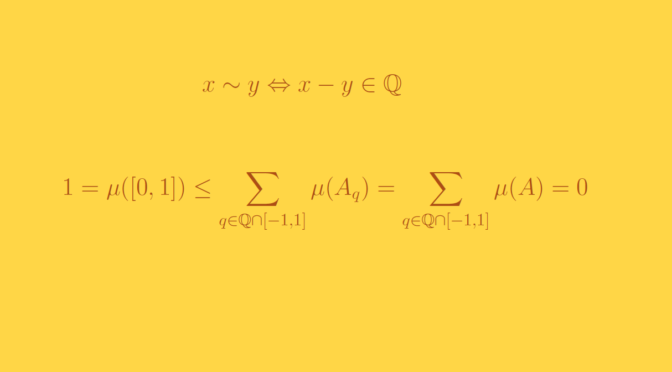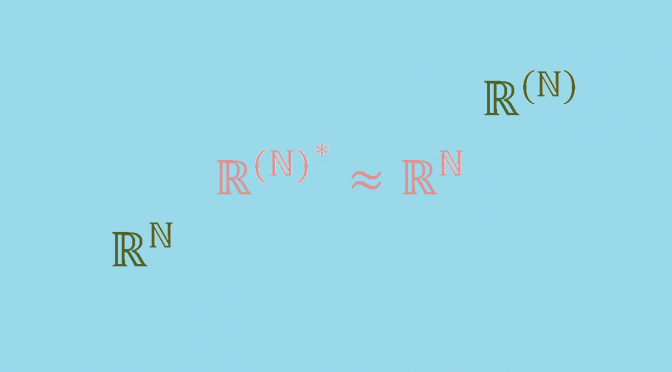We describe here a non-measurable subset of the segment \(I=[0,1] \subset \mathbb R\).
Let’s define on \(I\) an equivalence relation by \(x \sim y\) if and only if \(x-y \in \mathbb Q\). The equivalence relation \(\sim\) induces equivalence classes on \(I\). For \(x \in I\), it’s equivalence class \([x]\) is \([x] = \{y \in I \ : \ y-x \in \mathbb Q\}\). By the Axiom of Choice, we can form a set \(A\) by selecting a single point from each equivalence class.
We claim that the set \(A\) is not Lebesgue measurable.
For all \(q \in \mathbb Q\) we denote \(A_q = \{q+x \ : x \in A\}\). Let’s take \(p,q \in \mathbb Q\). If it exists \(z \in A_p \cap A_q\), it means that there exist \(u,v \in A\) such that
\[z= p+u=q+v\] hence \(u-v=q-p=0\) as \(u,v\) are supposed to be unique representatives of the classes of the equivalence relation \(\sim\). Finally if \(p,q\) are distincts, \(A_p \cap A_q = \emptyset\).
As Lebesgue measure \(\mu\) is translation invariant, we have for \(q \in \mathbb Q \cap [0,1]\) : \(\mu(A) = \mu(A_q)\) and also \(A_q \subset [0,2]\). Hence if we denote
\[B = \bigcup_{q \in \mathbb Q \cap [0,1]} A_q\] we have \(B \subset [0,2]\). If we suppose that \(A\) is measurable, we get
\[\mu(B) = \sum_{q \in \mathbb Q \cap [0,1]} \mu(A_q) = \sum_{q \in \mathbb Q \cap [0,1]} \mu(A) \le 2\] by countable additivity of Lebesgue measure (the set \(\mathbb Q \cap [0,1]\) being countable infinite). This implies \(\mu(A) = 0\).
Let’s prove now that
\[[0,1] \subset \bigcup_{q \in \mathbb Q \cap [-1,1]} A_q\] For \(z \in [0,1]\), there exists \(u \in A\) such that \(z \in [u]\). As \(A \subset [0,1]\), we have \(q = z-u \in \mathbb Q\) and \(-1 \le q \le 1\). And \(z=q+u\) means that \(z \in A_q\). This proves the inclusion. However the inclusion implies the contradiction
\[1 = \mu([0,1]) \le \sum_{q \in \mathbb Q \cap [-1,1]} \mu(A_q) = \sum_{q \in \mathbb Q \cap [-1,1]} \mu(A) =0\]
Finally \(A\) is not Lebesgue measurable.


